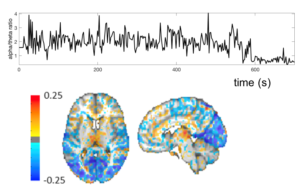Home » Supported Research » Tracking brain arousal fluctuations for FMRI big data discovery
Tracking brain arousal fluctuations for FMRI big data discovery
 Title:
Title:
Tracking brain arousal fluctuations for FMRI big data discovery
Project Number:
5K22ES028048-04
Contact PI/Project Leader:
Catie Chang
Award Organization:
National Institutes of Health
Abstract:
Recent years have seen rapid growth in the availability of large, complex functional magnetic resonance imaging (fMRI) datasets of the human brain. However, the potential of this fMRI Big Data is presently limited by our understanding of the neural sources that contribute to fMRI signals. Fluctuations in arousal (i.e., in the level wakefulness and alertness) are known to modulate cognitive and behavioral processes and to display prominent alterations in neuropsychiatric disorders. Yet, since the vast majority of fMRI datasets lack neurophysiological or behavioral indices of arousal, fMRI Big Data cannot be readily harnessed to understand human brain arousal in health and disease. Recent data-driven approaches attempt to fill this gap but have limitations. The overall goal of this proposal is to increase the transformative potential of fMRI Big Data for human neuroscience through a novel analytic framework for detecting arousal fluctuations from fMRI data alone. We will accomplish this goal by developing and disseminating tools for modeling arousal fluctuations based on powerful statistical learning methods (Specific Aim 1). We will apply these models to large fMRI databases of healthy aging and Alzheimer’s Disease, both of which are associated with altered arousal (Specific Aims 2 and 3). We will capitalize on these databases to determine how knowledge of brain arousal fluctuations improves neuroimaging biomarkers of aging- and neurodegenerative disease-related changes in human brain function, and the extent to which arousal itself constitutes an informative biomarker of these states. This research would, moreover, increase the reliability and translational potential of fMRI studies more broadly by providing the ability to account for these major neural (arousal) state changes. These immediate research goals form a strong bridge with my long-term research objective of understanding principles of brain function by developing and innovatively adapting methods for the analysis of large and complex neuroimaging datasets. This objective is enabled by the mentored training plan, where I will (i) develop expertise in cutting-edge machine learning techniques and (ii) apply these techniques to multimodal neuroimaging data. The two co-mentors have complementary expertise that align, respectively, with these two training components. Aims 1 and 2 will span the mentored phase and part of the independent phase, while Aim 3 (application to the Alzheimer’s Disease Neuroimaging Initiative data) will be performed in the independent phase. The mentored environment of the NIH Intramural Research Program provides the resources for all planned data acquisition, as well as a rich community of neuroscience investigators and seminars. Interaction with the extramural (Columbia University) co-mentor will occur through frequent video conferences and several visits, with opportunities to engage with the Columbia data science community.

